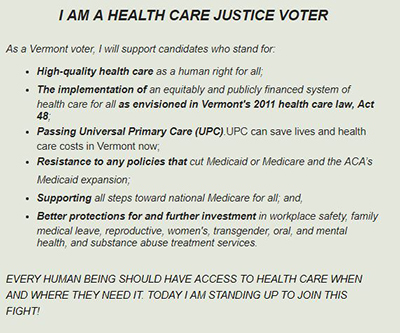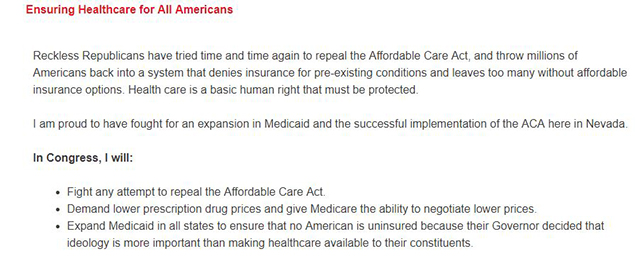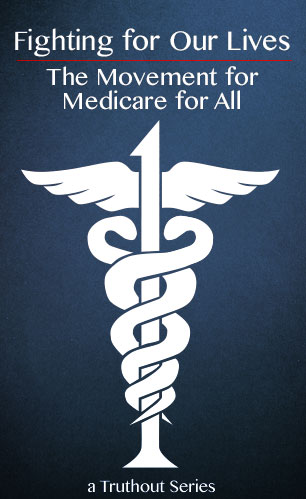
Part of the Series
Fighting for Our Lives: The Movement for Medicare for All
This piece is part of Fighting for Our Lives: The Movement for Medicare for All, a Truthout original series.
It has been just over a year since the Democratic Platform Drafting Committee held a vote over whether the party should endorse a single-payer, Medicare for All health care system. The committee predictably declined to put it in the platform by a 7-6 vote. The seven no votes came from delegates chosen by Hillary Clinton, whose campaign was awash in money from the for-profit health system.
Following the vote, an exasperated Michael Lightly, public policy director of National Nurses United, made an important point: “If this [policy] is controversial in this room, it is the only room of Democrats in which it is controversial.”
Indeed, the Democratic Party’s institutional opposition to Medicare for All contrasts mightily with the will of Democratic voters. According to recent polls, nearly 80 percent of Democrats and 60 percent of the public support expanding Medicare to cover everyone — the very policy the single-payer movement has been pushing for decades.
Yet, much of the party remains an obstacle, rather than a vehicle, to this important reform. Prominent leaders such as Clinton, House Minority Leader Nancy Pelosi and DNC chair Tom Perez have been hesitant at best and hostile at worst toward the policy.
So now, buoyed by momentum from the Bernie Sanders campaign and the opposition to the GOP assault on the health care, voters, organizations and candidates are sending a clear message: The failure of Democrats to support Medicare for All is morally indefensible. Those who don’t support this basic human right, organizers tell Truthout, should not be holding elected office.
“I feel strongly this issue should be a litmus test for candidates,” said Jessica Early, health care justice organizer for Rights and Democracy (RAD), in an interview with Truthout. “If you call yourself a progressive, and claim to be for the working class, the poor, for women … at a minimum you should support a public, equitable, universal health care system. If you can’t support that, who exactly are you for?”
Early is not alone in her belief that the issue should be a deal breaker in the coming election. It has become a uniting call to action for progressives and the left in general. Corporate Democrats are already seeing primary opponents who are making Medicare for All a central part of their platform.
Town halls demonstrate that in the current political climate, voters are not taking “no” for an answer.
Among those facing challenges from single-payer advocates are Pelosi, Sen. Joe Manchin, Rep. Debbie Wasserman Shultz, Rep. Ruben Kiheun and Sen. Diane Feinstein.
While Democrats made strong statements in support of health care as a right when they were fending off the GOP’s horrific policies, organizers note they are not backing those sentiments up when they refuse to account for the nearly 30 million people who are uninsured, even accounting for improvements made by the Affordable Care Act (ACA).
“Democrats need to stop playing both sides,” said Benjamin Day, director of Healthcare-Now, in an interview with Truthout. “You can’t claim you support the moral principle of health care as a right and refuse to back any policy that would make it happen. It is time to pick a side.”
Why “Democrats Are the Problem”
Rights and Democracy is one of many organizations that embrace the Sanders agenda and the down-ballot strategy. Other such organizations include Brand New Congress, the Incorruptibles, #WeWillReplaceYou, Justice Democrats and the Sanders-founded Our Revolution. It is important to note that some of these groups have a 501(c)(4) tax status, which means that — unlike a 501(c)(3) nonprofit — they can recruit, train and endorse candidates. Support for Medicare for All is among the most important issues to these groups.
 Right and Democracy, one of several organizations devoted to supporting progressive candidates, outlines its principles on health care policy. This is reflective of the sentiments of many organizations across the country. (Source: www.radvt.org)The hope, organizers say, is that, should the Democrats ever have a strong majority in the future, as they did in 2009 and 2010, they won’t pass up the historic opportunity to pass truly universal, public health care.
Right and Democracy, one of several organizations devoted to supporting progressive candidates, outlines its principles on health care policy. This is reflective of the sentiments of many organizations across the country. (Source: www.radvt.org)The hope, organizers say, is that, should the Democrats ever have a strong majority in the future, as they did in 2009 and 2010, they won’t pass up the historic opportunity to pass truly universal, public health care.
“The problem we have is actually with the Democrats,” said Early, who is a nurse practitioner. “We know how Republicans are going to vote on this issue. The obstacle we face is getting Democrats who will support us into office.”
There is evidence that confronting Democrats is starting to work. In the House, pressure is being galvanized around John Conyers’ Medicare for All bill (HR676). As Truthout previously reported, the bill has record support in Congress and now has 117 co-sponsors.
The most recent supporter is Rep. Brad Sherman of California, who co-sponsored the bill on Friday. Sherman is another Democrat who has received hefty sums from the health industry. However, he was pressured heavily on his failure to support the bill by disgruntled constituents at a recent town hall event. He offered empty excuses and platitudes, but the crowd seemed unconvinced as the questions kept coming. A month later, he signed onto the bill.
Sherman’s switch isn’t the only case in which the timing suggests this type of political pressure is making a difference. Videos showing progressives relentlessly pushing congressional Democrats — including Sherman, Feinstein, Catherine Cortez Masto and Claire McCaskill — on the issue have become commonplace. Constituents repeatedly ask about their stance on Medicare for All and jeer and rebut those who reject the policy or deflect from the question. These town halls demonstrate that in the current political climate, voters are not taking “no” for an answer.
Rep. Joseph Crowley of New York reluctantly co-sponsored HR676. He did so only after tremendous pressure from constituents and the introduction of a primary challenger, Alexandria Ocasio-Cortez. Cortez has the support of Brand New Congress and other progressive organizations, and she advocates for single-payer.
In the Senate, Bernie Sanders (now the most popular politician in the country) is expected to release a comparable bill in the coming weeks. There no doubt will be a major grassroots effort for Senate Democrats to co-sponsor the bill.
Sen. Elizabeth Warren finally came out in support of the reform this year. Wisconsin media has reported Sen. Tammy Baldwin is “likely a yes” on the policy. Sen. Kristen Gillibrand came out for Medicare for All as well. Sen. Ed Markey was a cosponsor of HR676 when he was in the House, so it is quite possible he would support similar legislation in the Senate.
Some other senators have recently expressed support for single-payer, or have at least tweaked their language in that general direction.
Democrats who oppose Medicare for All, by and large, are in the pocket of the insurance and drug industry.
Senate Minority Leader Chuck Schumer has said the chamber will look into “many ideas” to solve health care and “single-payer is one of them.” Sen. Richard Blumenthal said, “single-payer will happen — if you’re talking in 10 or 20 years.” Sen. Mazie Hirono told Vox, “I support single-payer,” but qualified it with “but in this environment?” Sen. Cory Booker has made the same basic argument as Hirono. Sen. Kamala Harris told a crowd in California that, “as a concept, I’m completely in support of single payer,” but “we’ve got to work out the details, and the details matter on that.”
Politicians have responded to populist fervor before when the political moment called for it — Clinton’s about-face on trade is a good example. But even if these statements are the result of cold political calculation, this shift in language demonstrates how growing pressure on Democrats is working. Consider that when Sanders released a Medicare for All bill in the Senate in 2013, he had no co-sponsors.
“We think the enthusiasm and energy behind [single-payer] reflect how much Americans care about this issue,” said Dr. Carol Paris, president of Physicians for a National Health Program (PNHP), in an interview with Truthout.
Rep. Conyers has made the same point, saying in a statement, “I have never seen more enthusiasm and energy behind this issue than what I’m seeing today.”
“One Death Is Too Many”: A Grieving Mother Comes to Washington
One person who has witnessed this dynamic firsthand is Rep. Ruben Kihuen, a young freshman member of Congress representing Nevada’s 4th district. In 2016, he ran a campaign arguing that “health care is a basic human right,” and he is now a member of the Congressional Progressive Caucus.
 Rep. Ruben Kihuen declares support for health care as a “human right” in his campaign literature, but refuses to back up these words with action. He is one of the few members of the Congressional Progressive Caucus not to co-sponsor John Conyers’ Medicare for All bill. (Source: www.rubenforcongress.com)
Rep. Ruben Kihuen declares support for health care as a “human right” in his campaign literature, but refuses to back up these words with action. He is one of the few members of the Congressional Progressive Caucus not to co-sponsor John Conyers’ Medicare for All bill. (Source: www.rubenforcongress.com)
Given this profile, Kihuen may have hoped he would not face a primary challenger from the left. However, despite his proclamations and self-identified progressive politics, Kihuen refuses to join his 117 colleagues in the House and endorse HR676. During his campaign in 2016, the health care industry was his third largest donor, according to data the Center for Responsive Politics.
People in his district noticed. One of them was Amy Vilela, a Nevada businesswoman who says her daughter became one of the thousands of Americans who die each year because our country does not have a universal public health care system, a position that stands in stark contrast to international norms of the industrialized world.
Vilela’s daughter’s name was Shalynne McKinney-Ramos. Facing severe pain in her leg, which she rated as an 8 out of 10 on the pain scale, she sought treatment at the emergency room at Centennial Hills Hospital. McKinney-Ramos had recently left a job, and had not yet enrolled in classes for the coming school year, and the hospital mistakenly believed she didn’t have insurance. In a country with patchwork health care with countless cracks to fall through, such mistakes are common, and often deadly. Vilela believes the hospital treated her daughter as if she was uninsured — a tactic known as a wallet biopsy — and that this led to her dying a preventable death.
In what Vilela’s lawyers call a clear violation of the Emergency Medical Transportation and Labor Act, the hospital effectively told her daughter to “get insurance and go see a specialist,” Vilela said. “This was despite having nearly all the signs, symptoms, and risk factors of a blood clot.”
Feeling embarrassed and neglected, McKinney-Ramos left the hospital.
“Not long after that she died in my arms,” Vilela said in an interview with Truthout. “It turned out she had a massive clot which led to a pulmonary embolism. The doctors could not believe the staff at the ER did not notice the severity of her situation.”
Vilela was initially overwhelmed with grief and isolated herself for about a year until, with the help of friends and family, she turned her grief into action.
“My sister saved my life,” she said. “She told me she had already lost Shalynne and now she felt she was losing me.”
So, Vilela decided to become an advocate for a Medicare for All style health system. In addition to suing the hospital that denied care to her daughter (litigation is ongoing), she sought to hold accountable the woeful American health care system and the politicians who enable it.
Since her own congressman refused to support the only bill in Congress that creates universal health care, and her daughter died after allegedly being mistreated in a hospital in his district, she decided to run against him herself.
“I never had any ambition to run for Congress. But without health you have nothing. People are dying in America,” she said. “Medicare for All is probably the cornerstone of my campaign.”
On Mother’s Day of this year she attended a town hall meeting with Kihuen to make her case. This led to a jaw-dropping exchange between Rep. Kihuen and Vilela, her husband, and other constituents. Vilela explained the tragic story of her daughter’s death, while she and others challenged Kihuen on his failure to sponsor single-payer.
When he responded with deflections and platitudes, they countered with facts and with passion. By the end of the town hall, Kihuen, visibly frustrated, told the crowd he “really hopes” they are not calling his office, insisting they should be bothering Republicans instead.
“He made all sorts of excuses. North Korea, the Affordable Care Act. He ended up being really dismissive,” Vilela said. “We need to elect people who are serious about providing health care to everybody. No one is safe until we fix this. What are we waiting for?”
Single-Payer as a Smart Electoral Tactic
In addition to the obvious moral and economic arguments for Medicare for All, advocates argue that it is likely to be winning issue. There is widespread sentiment that the party’s milquetoast progressivism and relationship to corporate donors is one of many reasons the party has squandered power in Washington and beyond.
Beyond support for Medicare for All, perhaps the most notable distinction between establishment Democrats and their left-leaning primary opponents is where they get their money. Democrats who oppose Medicare for All, by and large, are in the pocket of the insurance and drug industry — two of the most powerful lobbies in Washington.
Most of the progressive primary challengers, however, are refusing corporate money, in stark contrast to the establishment wing of the party.
“The Democratic Party has been tone deaf. That is the real takeaway from the 2016 elections. The centrist/corporate message is not working,” Early said.
The alternative that may result in electoral success, advocates argue, is fighting for a progressive economic agenda, with a strong emphasis on Medicare for All.
“Health care is an issue [that] resonates with people because it is real and salient. But what are Democrats doing?” Early said. “You either support health care as a right, or you go home and we find someone who will.”
Join us in defending the truth before it’s too late
The future of independent journalism is uncertain, and the consequences of losing it are too grave to ignore. To ensure Truthout remains safe, strong, and free, we need to raise $46,000 in the next 7 days. Every dollar raised goes directly toward the costs of producing news you can trust.
Please give what you can — because by supporting us with a tax-deductible donation, you’re not just preserving a source of news, you’re helping to safeguard what’s left of our democracy.
